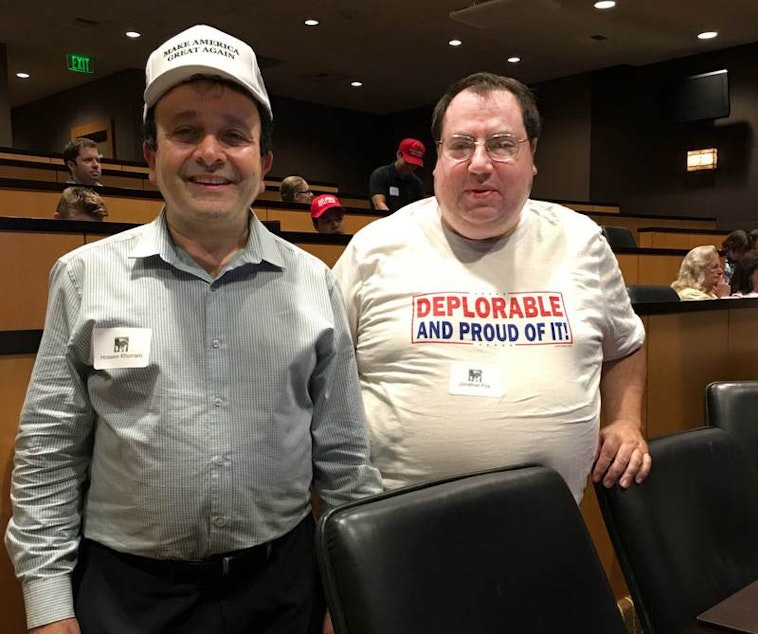A Muslim who supports Trump despite the words that come from his mouth

There are about 20,000 self-identified Muslims in Washington state – and some are voting for Trump.
Hossein Khorram, an Iranian American Muslim has been an active member of the Republican Party for the past 15 years as a fundraiser and has been elected as a state delegate for the Republican National Convention three times. At the first presidential debate viewing party in Downtown Bellevue, we followed Khorram around as he introduced us to his friends.
“When I’m with my Republican friends,” Khorram said, “I feel just right. I feel at home!”
Khorram grew up in northern Tehran. In the 1970s, when the Islamic revolution began, his family fled the country and resettled in the United States.
His father continued to travel between the U.S. and Iran for work. On one such trip, he was out hunting with some friends when the revolutionary guards stopped them, accused the group of plotting a coup against the regime, and arrested them.
Sponsored
They were taken to Evin Prison, a prison notorious for its political prisoners and executions. The guards blindfolded Khorram’s father and friends, lined them up. But instead of shooting at them, they shot into the air.
“The guards said, 'We’ll kill you tomorrow,'” Khorram recounted. The following day, the guards lined the group up again and threatened to shoot them but again shot their guns into the air.
This went on for days. Finally, Khorram’s father was transferred to another prison where he was detained for eight months.
One day the prison clergy walked up to Khorram’s father and offered him a deal: Pay $80,000 as compensation for their hospitality and they would let him out for a vacation for one day.
"My aunt came up with the money, and they had him leave for one day, but the understanding was he would never come back."
Sponsored
By this time, the regime had seized all the Khorram family’s assets. Khorram’s father had nothing – they lost possession of their houses, bank accounts, everything. The family borrowed money from friends, and Khorram’s father managed to escape and reunite with his family in the U.S.
“Politics tore our life apart,” Khorram said. “Before this revolution, we were just ordinary people who didn’t really care for politics, but we paid a very dear price. Our life became political."
Khorram became active in the Iranian resistance to the regime.
“The one thing that compels me to the Trump campaign is the way appeasement policies have not paid off,” Khorram said. “Since President Obama signed the nuclear agreement with Iran, we have to let go of appeasement and the time is now."
We met Khorram in an apartment building he owns as a real estate developer in Downtown Bellevue. Most of the tenants are older Iranian men and women who are voting for Trump for the same reasons as Khorram.
Sponsored
When asked what he thought of Trump’s plan to ban Muslims from entering the U.S., Khorram said he doesn’t believe that's what Trump means. He understands the policy as a temporary halt on visas from war-torn countries like Syria where background checks are much harder to implement.
“[Trump] isn’t here to discriminate against Muslims," he said. "We should expand our process of vetting and I do not think that will discriminate against any religion. It would discriminate against people who have bad intent.”
Not all Muslims in Washington feel the same way, of course.
Ghassan Mansour, a Lebanese-American Muslim, is a real estate agent in Lynnwood and a longtime justice activist. He believes Trump would be dangerous for this country.
Mansour has been a delegate at the Democratic National Convention twice and often campaigns for peace and justice. He picketed with the Church Council in Downtown Seattle against the Iraq War in 2003 and petitioned for the release of Nelson Mandela 15 years before his release.
Sponsored
“We’re all fed up with the Bushes and the Clintons and the system. I am fed up. But Trump is the wrong choice. What he’s saying, dividing the country, is very dangerous,” Mansour said.
He, like Khorram, believes Hillary Clinton will not be good for Middle East foreign policy. But to Mansour, the first priority in this election should be to the candidate who will be best for the U.S. domestically.
“It doesn’t lessen my love for my first country, Lebanon. But I have to think of America first,” he said.
Mansour sees a future under Trump’s leadership as one of increased racism against Muslims, and he is already seeing hints of it transpire today. His son returns from school to tell him how he was bullied, and how he is afraid to be caught in the crossfire this election. Nationally, hate crimes against Muslims are at their highest since the period after 9/11.
“We know what Trump wants. He doesn’t want us here; he’s saying we don’t look like anybody else," Mansour said. "He wants to bring America back to if you’re brown, if you’re black, if you’re Mexican, if you’re Muslim, you don’t belong here. What’s at stake this election is America. American unity.”
Sponsored
No matter what side of the debate they may fall, whether for Donald Trump or for Hillary Clinton, most Muslims seem to agree on one thing: There is a lot at stake for the country. And the decisions we make this election will chart a new tone for America going forward.
Hebah Fisher is the co-founder of Kerning Cultures, a podcast about the politics, culture and history of the Middle East.
